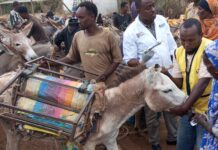By Omboki Monayo
Nairobi, Kenya: When Damaris Ayoo complained of joint pains and feeling extremely cold, her worried children rushed her to a hospital in Kisumu City. “We were worried that it was a case of severe malaria, and at her age, such health challenges are a threat to her life,” her daughter Selina Awuor told Talk Africa.
Upon her admission to the facility, the 81-year-old spent an uncomfortable night.
“She was coughing and sneezing for most of the night,” said her daughter, who is her mother’s prime caregiver.
The next morning, the medics attending to the octogenarian and grandmother recommended that she be tested for pneumonia and TB.” Doctors told us they needed to establish what was causing the coughing. Testing her would reveal the cause and enable them to treat her effectively,” she told Talk Africa.
As the story went to press, the family was awaiting the results of the tests. Damaris is not alone. She joins other Kenyans who have recently fallen ill due to chest-related complications.
The Ministry of Health has reassured the public that there was no cause for alarm over the re-emergence of the COVID-19 viral menace, saying that it was other respiratory infections associated with this period that were on the rise.
In a March 28, 2024 press release signed by Acting Director General of Health Dr Patrick Amoth, the government confirmed that its findings were based on surveillance of disease prevalence carried out since 2004.
He said the diseases normally occur in a cycle that spans four months every year.
“The ministry has been monitoring influenza cases over the last two decades. We have observed the occurrence of cases throughout the year with an upsurge of cases in two peaks, February to March and July to November,” the statement read.
Dr Amoth further confirmed that the ministry has been keeping an eye on the COVID-19 situation since December 2023, with particular focus on the JN1 variant, whose emergence in the country has been widely reported in the media.
“In addition, the Ministry has been monitoring the SARS-Cov-2 cases with a focus on the new JN1 variant since December 2023. Recently, the media has reported an increase in the number of patients reporting respiratory infections and have attributed them to Covid-19,” the medic said.

The JN.1 variant, stemming from BA.2.86, has developed enhanced transmissibility due to one or two additional mutations. While it retains the immune evasion characteristics of its predecessor, it has now evolved to spread more effectively.
Dr Amoth confirmed that the ministry had set up a robust early warning system consisting of a nationwide passive surveillance system, 9 sentinel surveillance sites, 8 event-based sites spread across 8 counties, integrated facility-based sites in 12 locations, and mortality-based surveillance found in 10 sites.
“We wish to reassure the public that the ministry has a robust surveillance system that monitors the emergence and spread of flu and other pathogens of national, regional, and concern,” the acting director general said.
Dr Amoth confirmed that the government had not identified any surge in COVID-19 cases related to the new variant.“None of these sites have reported an increase in the numbers of COVID-19 but increased cases of influenza have been reported,” he said.
He assured Kenyans that the ministry was on the lookout for surges in cases of respiratory infections. The medic, who also serves as the vice president of the World Health Organization’s board representing the African region, asked Kenyans to be keen on ensuring that medical treatment is availed to patients with breathing difficulties, particularly children, expectant women, individuals with vulnerable immune systems and the elderly.
“Special attention should be applied to cases showing signs of breathing difficulties and suspected infections among children, the aged, pregnant women, and among people with pre-existing conditions such as cancer, TB, HIV, diabetes, heart disease, and others,” he said. These groups should promptly be referred to health facilities for prompt treatment,” said the medic.
The caution that was issued on the eve of the Easter holidays was contained in a Ministry of Health alert on the outbreak of respiratory infections in the country. It asked Kenyans to exercise heightened hygiene to avoid respiratory infections as the country goes through its annual season of increased cases.
Dr. Amoth underscored the importance of adhering to social distancing measures and maintaining regular hand hygiene.
Avoid close contact with people who are sick especially those with respiratory symptoms. If you are sick, limit contact as much as possible to keep from infecting them,” said the medical expert.
He also asked Kenyans to ensure they practice proper cough hygiene to reduce the spread of respiratory disease.
“Cover your nose and mouth with tissue paper when you cough and when you cough or sneeze, throw the tissue in the trash. Wash your hands often with soap and water or an alcohol-based hand rub if soap is not available,” he said.
“Avoid touching your eyes, nose, and mouth. Germs spread this way,” added the health services boss. Dr Amoth asked Kenyans to be extra vigilant on hygiene, saying there was a need to keep surfaces clean by thoroughly wiping them.
“Clean and disinfect surfaces and objects that may be contaminated with viruses that cause flu,” read the document. Dr Amoth is asking Kenyans to get the flu vaccine to increase their level of protection against infection. He is also asking the public to wear masks when in public spaces.
“Wear masks when in public spaces. If possible, get vaccinated against influenza. Seasonal flu vaccines are available are commercially available in Kenya,” he said.














